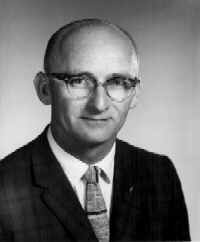Common Copyright (C), 1995

Glenn McMurry in 1967
Taken While Working At The University of Southern California
FOREWORD
Common Copyright (C), 1995

Glenn McMurry in 1967
Taken While Working At The University of Southern California
I learned a lot from Don Figge, my friend in the printing business. While I was at the University of Southern California, he was the one who helped me to print leaflets, booklets, and film catalogs. We often had "working" lunches together. One day he told me about his experiences with various "would-be" authors who wanted to publish their life stories.
"Whenever someone wants us to print a book about his life," Don explained, "We say, 'Sure, we'll do it.' Then we quote the various costs involved."
"However, we know it probably won't sell! The guy will give copies to his friends and relatives and have many copies left over. We call such books, 'vanity books'."
Of course, that was a polite way for Don to tell me never to write a book about myself! Well, at least, not to try to publish it.
One day, being retired and having a computer at hand, I felt compelled to write about some of my life experiences. I felt I wanted my children and grandchildren to know something about the depression and the dust bowl days of my childhood and youth.
Soon I found myself writing memories in no particular order. My wife, who had been an English teacher, looked at what I was doing and said, "You need an outline!"
With her help, we made an outline covering all my life up to retirement. With this outline, I soon discovered I was writing an autobiography of my whole life, not just the depression and dust bowl days.
Several years went by and I kept writing and writing. Then I suffered a stroke and for a time I wondered whether I could still write at all. However, as healing took place, I found using the computer keyboard was a way to help me express myself. My hands, trained earlier to do speed typing, seem to write and spell even when my mind didn't guide them. Although my words weren't always exactly in order, they made enough sense that my wife could fix them.
The more I wrote, the more I remembered. It soon became apparent there would be enough material for a book. But I still remembered Don's advice, and I realized there might not be many, other than my immediate family, who would be interested in my activities. Of course, I've never been too sure just how much interest even they might have.
IMPORTANT PERSON
One day, seeing how much time I was spending and how serious I was about getting all details correct, my wife warned me that I shouldn't get too excited about my "book." She said people only read about important people, such as presidents, movie stars, war heroes, and business tycoons. Now I thought about that and I decided that I was an important person to some people. My family has always let me know I am important to them. My teachers and, especially, some of my Bethel College professors, acted as if I was important. My bosses seemed to think I was important. During World War II, Uncle Sam must have thought I was important to keep me so long in the Pacific. My pastors throughout the years have told me I am important to God as are all His children. Of course, none of the above is proof that anyone will want to read my story, but all that reasoning gave my a title for my writings, "The Autobiography of an Important Unimportant Man."
The Bumble Bee
There are times when I feel I'll never get finished with my writing. Things seem to get lost in the computer that I am sure I've written. My wife often gets discouraged because she proofs a section, and then I decide to change things.
Of course, as I keep remembering more and more experiences, this story may never be completed to my satisfaction. However, I keep remembering something I learned from Bishop Gerald H. Kennedy of the United Methodist Church. He often quoted someone who said, "By all the laws of science and physics, a bumblebee can not fly. The poor old bumblebee is so dumb he doesn't know this, so he just up and flies anyway."
For some reason I feel that the bumble bee and I have a lot in common. Someday I may finish this story just because I'm too dumb to know it can't be done. However, whether it's ever really complete and whether anyone cares to read it, it has done me lots of good as I was writing to know that at least the computer is always listening to me!
That night I went to bed, thinking about what Greg had said. All of a sudden the title came to me. I remembered several stories Glenn had written about cow chips on the farm when he was a kid. Then I remembered how he discovered computers while at the University of Southern California, and made them work for him and his ideas. It was a natural: "From Cow Chips to Computer Chips."
After a recent visit with the psychiatrist who tries to help Glenn face his disabilities since his stroke, I realized we had to add another element to the title. He compared Glenn's brain to a computer. He explained just as computer chips sometimes get damaged or destroyed, Glenn's stroke had caused damage to some of his brain "chips."
That led me to lengthen the title to: "From Cow Chips through Computer Chips to Damaged Chips."
Darlene McMurry,
wife of the author
Click
Here For Darlene's Autobiography
